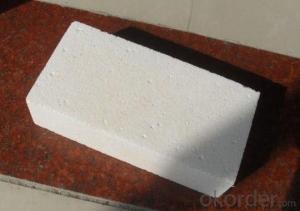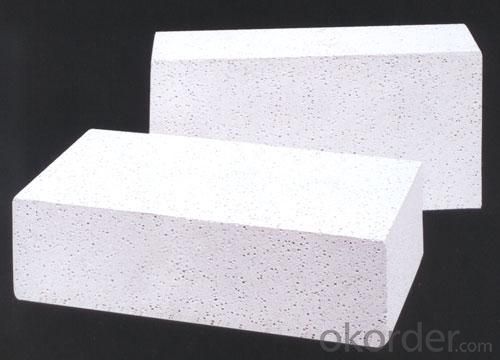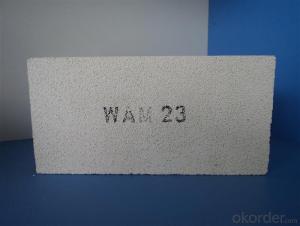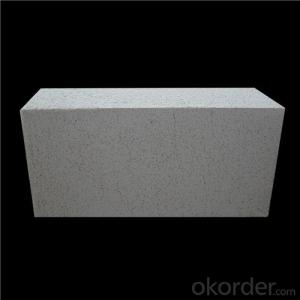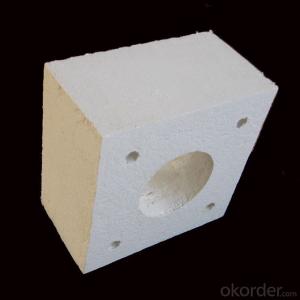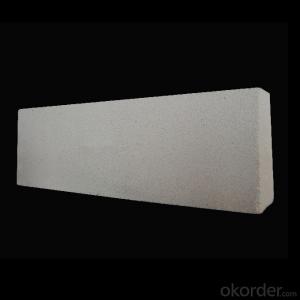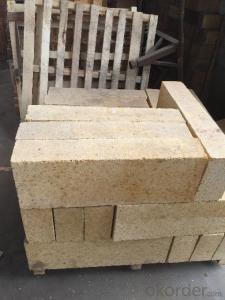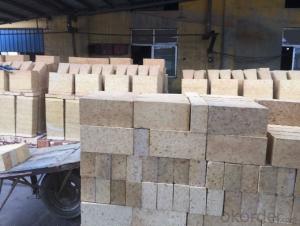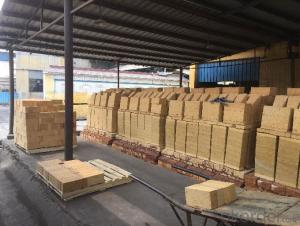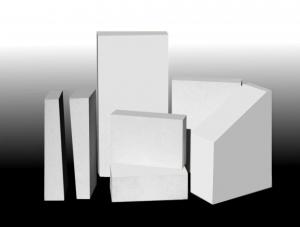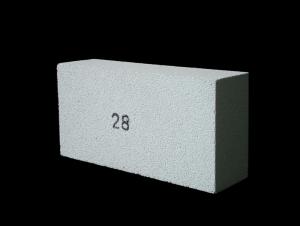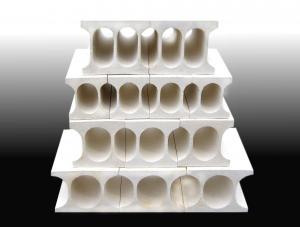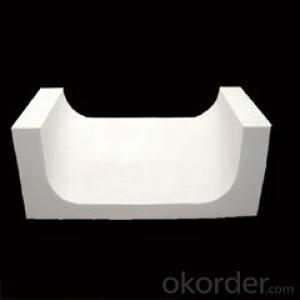Insulating Fire Brick 65% Al2O3 Min High Alumina
- Loading Port:
- Shanghai
- Payment Terms:
- TT OR LC
- Min Order Qty:
- 500 m.t.
- Supply Capability:
- 1000 m.t./month
OKorder Service Pledge
OKorder Financial Service
You Might Also Like
Specifications
1.65% Al2O3 min;
2. Refractoriness: 1790C min;
3.For steelmaking furnaces;
4.ISO 9001 Certificate;
5.Custom shape.
High alumina insulating fire brick is a kind of insulation material adopting organic matter as ignition loss substance in order to increase the porosity of refractory, which has such advantages as high porosity, small volume density, good insulation effect, high mechanical intensity, small thermal conductivity and long service life. For various industrial kilns & furnaces, it is a kind of essential refractory for energy saving and temperature preservation.
This series of High Alumina Insulating Fire Brick are made of selected high alumina bauxite, kaolin caly, hollow microsphere as the mian material.By shaping at high pressure and sintering at high temperature.
| Items | Mark | ||||||
Hihg Alumina brick | Clay brick | Phosphoric acid dipping clay brick | |||||
| GL-65 | GL- 55 | GL- 48 | ZGN-42 | ZGN-42 | |||
| Chemical Compositions ( %) ≥ | Al2O3 | 65 | 55 | 48 | 42 | 42 | |
| Fe2O3 | 2.0 | 2.0 | 2.0 | 1.6 | 1.7 | ||
| P2O5 | - | - | - | - | - | 7 | |
| Refractoriness ℃ | 1790 | 1770 | 1750 | 1750 | 1750 | - | |
| Apparent Porosity (%)≤ | 19 | 19 | 18 | 15 | 16 | 14 | |
| Alkali resistance (strength degradation)%≤ | - | - | - | - | - | 15 | |
| 0.2MPaRefractoriness under load,℃≥ | 1500 | 1480 | 1450 | 1450 | 1430 | 1450 | |
| CCS (Mpa)≥ | 58.8 | 49 | 49 | 58.8 | 49 | 60 | |
| Dead burnt linear change(%)≤ | 1450℃×2h | 0/-0.2 | 0/-0.2 | 0/-0.3 | 0/-0.2 | ||
| 1500℃×2h | 0/-0.2 | ||||||
Starting from the raw material into factory, Every production process of high alumina insulating fire bricks should through strict quality control, both the raw materials and finished products should be inspected time after time, to esure that each product to satisfy our customers, because of advanced automatic batching system and 2500 tons automatic hydraulic machine in the world were introduced, then a new line of the ladle fire bricks and other styling refractory products with a superior quality was put into production.
- Q: Are insulating fire bricks suitable for insulation in steam boilers?
- Yes, insulating fire bricks are suitable for insulation in steam boilers. They are designed to withstand high temperatures and provide excellent thermal insulation, making them ideal for use in steam boilers to minimize heat loss and improve energy efficiency.
- Q: Can insulating fire bricks be used for insulation in cold storage facilities?
- Yes, insulating fire bricks can be used for insulation in cold storage facilities. Insulating fire bricks are made from lightweight materials with high insulating properties, such as ceramic or refractory fibers. They have low thermal conductivity, which means they can effectively prevent heat transfer and maintain a stable temperature inside the cold storage facility. The bricks are also resistant to extreme cold temperatures and can withstand thermal shock, making them suitable for use in cold storage applications. Additionally, insulating fire bricks are durable and can provide long-term insulation, reducing energy consumption and maintaining the desired temperature for storing perishable goods.
- Q: Can insulating fire bricks be used in high-temperature insulation for cryogenic applications?
- Insulating fire bricks are not suitable for high-temperature insulation in cryogenic applications. Insulating fire bricks are designed to withstand temperatures up to around 2300°F (1260°C), which is well below the extremely low temperatures required for cryogenic applications. Cryogenic temperatures can range from -150°C to -273°C (-238°F to -459°F), and insulating fire bricks would not be able to provide adequate insulation at these temperatures. Instead, specialized materials such as aerogels or multi-layered insulation systems are commonly used for cryogenic insulation to ensure low heat transfer and maintain the extremely low temperatures required.
- Q: Can insulating fire bricks be used in high-temperature filters?
- Yes, insulating fire bricks can be used in high-temperature filters. These bricks are designed to withstand extreme temperatures and provide excellent insulation. They can effectively trap and filter out impurities in high-temperature environments, making them suitable for use in high-temperature filters.
- Q: Are insulating fire bricks suitable for use in oil refineries?
- Insulating fire bricks do not typically suffice in oil refineries due to their inability to withstand the corrosive and abrasive nature of oil and its byproducts, despite being designed for high temperatures. Oil refineries involve a complex process of refining crude oil into various petroleum products, which often exposes materials to harsh chemicals and high temperatures. Instead, refractory bricks or castables specifically tailored to endure the corrosive and abrasive conditions present in the refining process are commonly employed. These refractory materials possess chemical resistance, high strength, thermal shock resistance, and the ability to withstand the extreme temperatures encountered during refining. Moreover, oil refineries necessitate materials that offer excellent insulation properties while also being durable and resistant to thermal stress. While insulating fire bricks possess good insulation properties, they may not possess the necessary durability and resistance to thermal stress demanded in the demanding environment of an oil refinery. Hence, it is advisable to utilize refractory bricks or castables that are designed specifically for oil refineries. These materials can provide the requisite resistance against chemicals, high temperatures, and thermal stress, ensuring the refinery operates safely and efficiently.
- Q: Can insulating fire bricks be used in the construction of hot water boilers?
- Indeed, hot water boilers can utilize insulating fire bricks for their construction. These bricks are specifically engineered to endure extreme temperatures and offer exceptional thermal insulation. Their low thermal conductivity effectively minimizes heat dissipation, thereby enhancing the overall energy efficiency of the boiler. Furthermore, these bricks exhibit remarkable resistance to thermal shock, rendering them suitable for the intense heat generated within hot water boilers. Moreover, their lightweight composition facilitates effortless handling and installation in the boiler, rendering them a favored option for insulation in the construction of hot water boilers.
- Q: Are insulating fire bricks resistant to cracking?
- Insulating fire bricks are specifically designed to have a high resistance to cracking. They are made from lightweight ceramic materials that have low thermal conductivity and high thermal shock resistance. These properties enable the bricks to withstand rapid temperature changes without cracking. Additionally, insulating fire bricks undergo a firing process that strengthens their structure and minimizes the risk of cracking. However, it is important to note that extreme thermal shock or physical impact can still potentially cause cracking in insulating fire bricks, so proper handling and installation techniques should be followed to ensure their longevity and effectiveness.
- Q: Can insulating fire bricks be used for insulation in power plants?
- Yes, insulating fire bricks can be used for insulation in power plants. Insulating fire bricks are designed to have excellent thermal insulation properties, which make them suitable for high-temperature applications. They can withstand extreme temperatures and provide effective insulation to prevent heat loss and increase energy efficiency in power plant operations. The insulating fire bricks are often used in various areas of power plants, such as furnaces, boilers, kilns, and chimneys. They can be used to line the walls, floors, and roofs of these structures to reduce heat transfer and maintain the desired temperatures inside the equipment. In power plants, insulating fire bricks help to minimize heat loss, improve combustion efficiency, and reduce thermal stress on the equipment. By providing a barrier against heat transfer, they help in conserving energy and reducing operational costs. Additionally, the insulation properties of these bricks also contribute to a safer working environment for power plant personnel. It's worth noting that while insulating fire bricks are suitable for insulation in power plants, they should be selected carefully based on the specific requirements and conditions of the power plant. Factors such as the operating temperature, chemical exposure, and mechanical stress should be considered to ensure the bricks can withstand the harsh conditions and provide long-lasting insulation performance.
- Q: Are there any safety precautions to consider when using insulating fire bricks?
- Yes, there are safety precautions to consider when using insulating fire bricks. Firstly, it is important to wear appropriate personal protective equipment, such as gloves and safety goggles, to protect against potential injuries. Additionally, due to the high temperatures involved, it is crucial to handle the bricks with care to avoid burns or related accidents. Adequate ventilation should be ensured to prevent the buildup of harmful gases and fumes. Lastly, it is essential to follow the manufacturer's instructions and guidelines for proper installation and usage to minimize any potential risks.
- Q: Do insulating fire bricks have a high electrical resistivity?
- Yes, insulating fire bricks generally have a high electrical resistivity. This is because these bricks are specifically designed to have low thermal conductivity and high thermal resistance, which also translates into high electrical resistivity. The insulating materials used in these bricks, such as alumina, silica, and other refractory materials, have inherently high electrical resistivity. Additionally, the manufacturing processes often involve the addition of insulating additives, further enhancing the electrical resistivity of the fire bricks. As a result, insulating fire bricks are effective in reducing heat transfer and maintaining high temperatures in various industrial applications, such as kilns, furnaces, and thermal insulation systems.
Send your message to us
Insulating Fire Brick 65% Al2O3 Min High Alumina
- Loading Port:
- Shanghai
- Payment Terms:
- TT OR LC
- Min Order Qty:
- 500 m.t.
- Supply Capability:
- 1000 m.t./month
OKorder Service Pledge
OKorder Financial Service
Similar products
Hot products
Hot Searches
Related keywords
